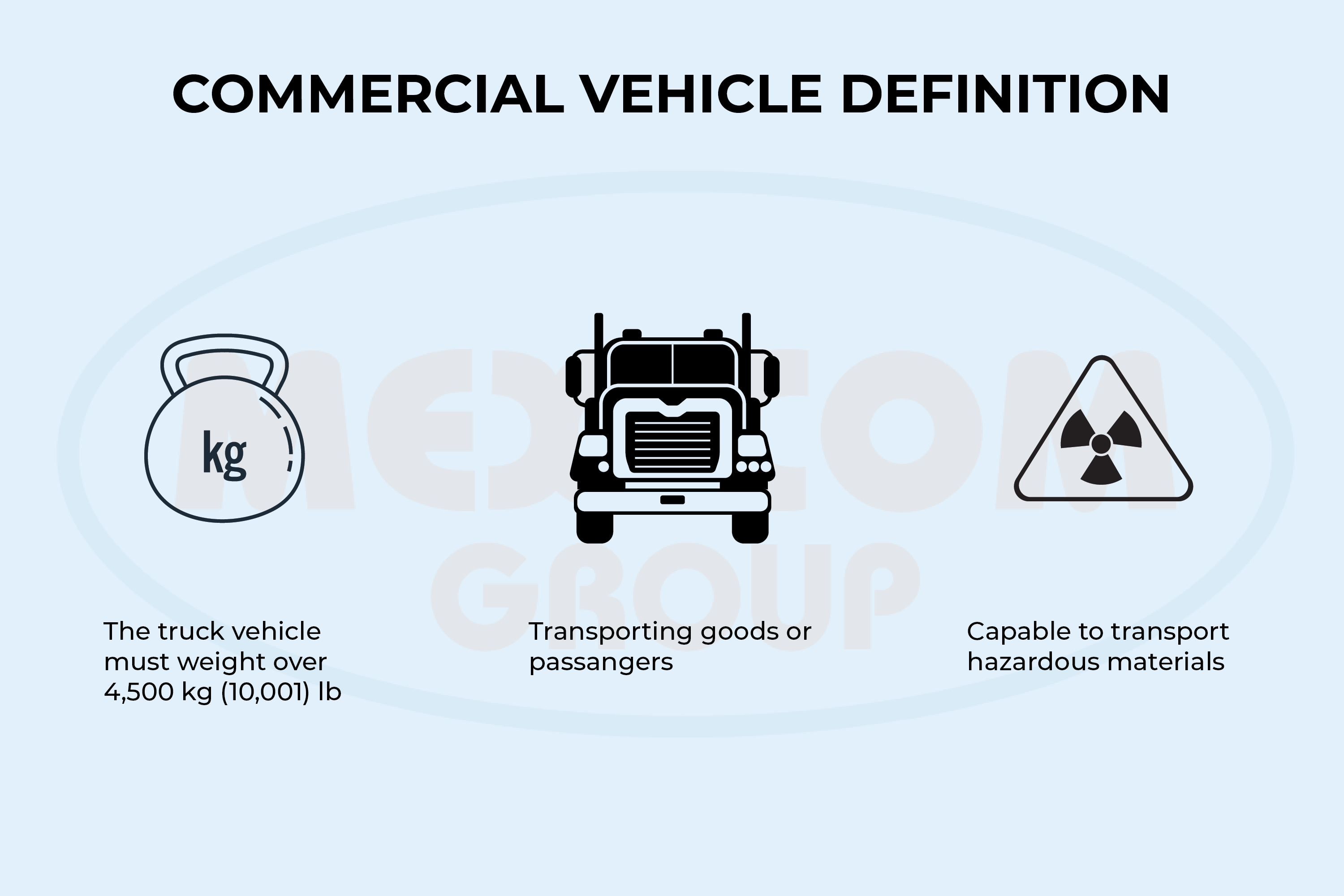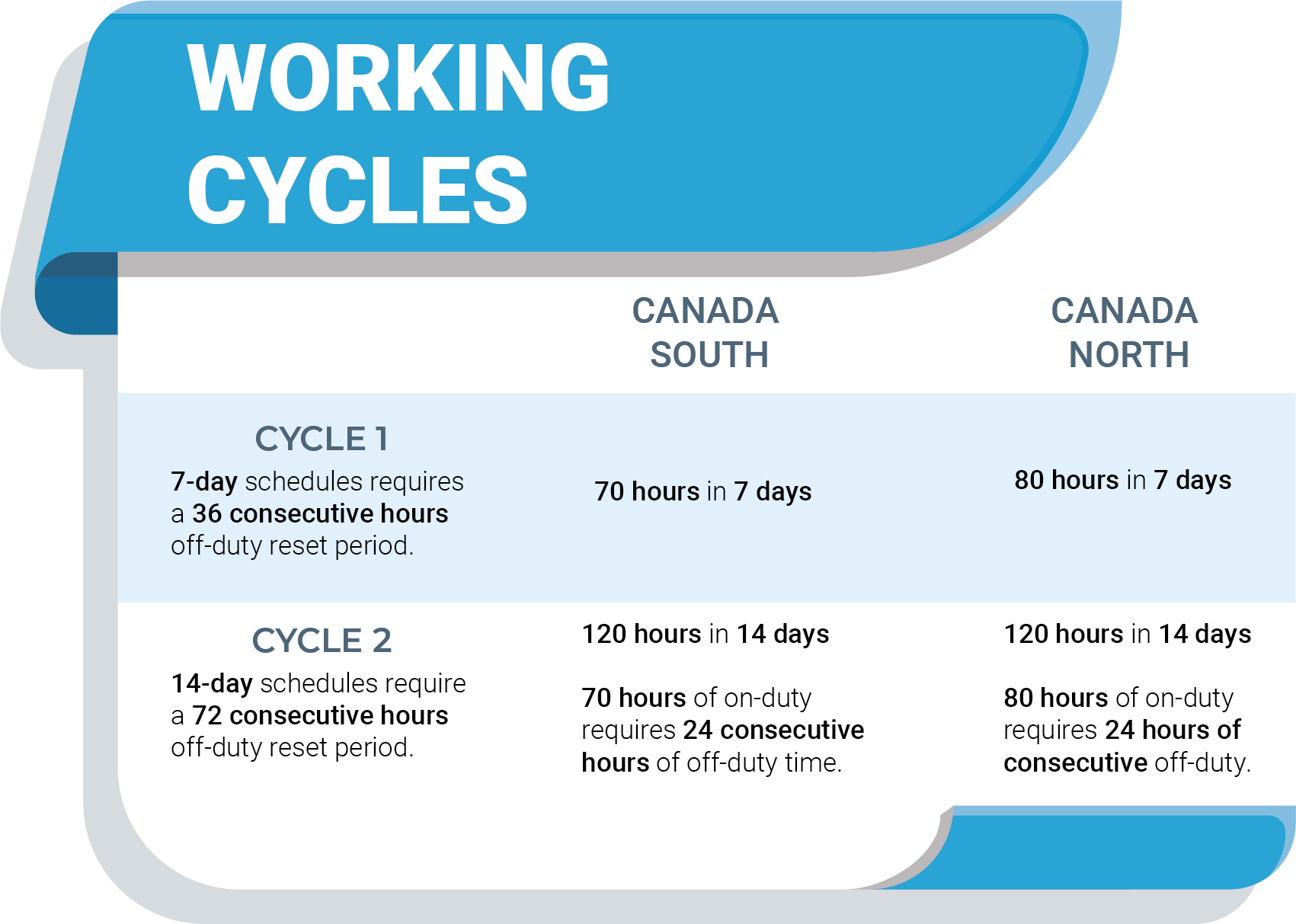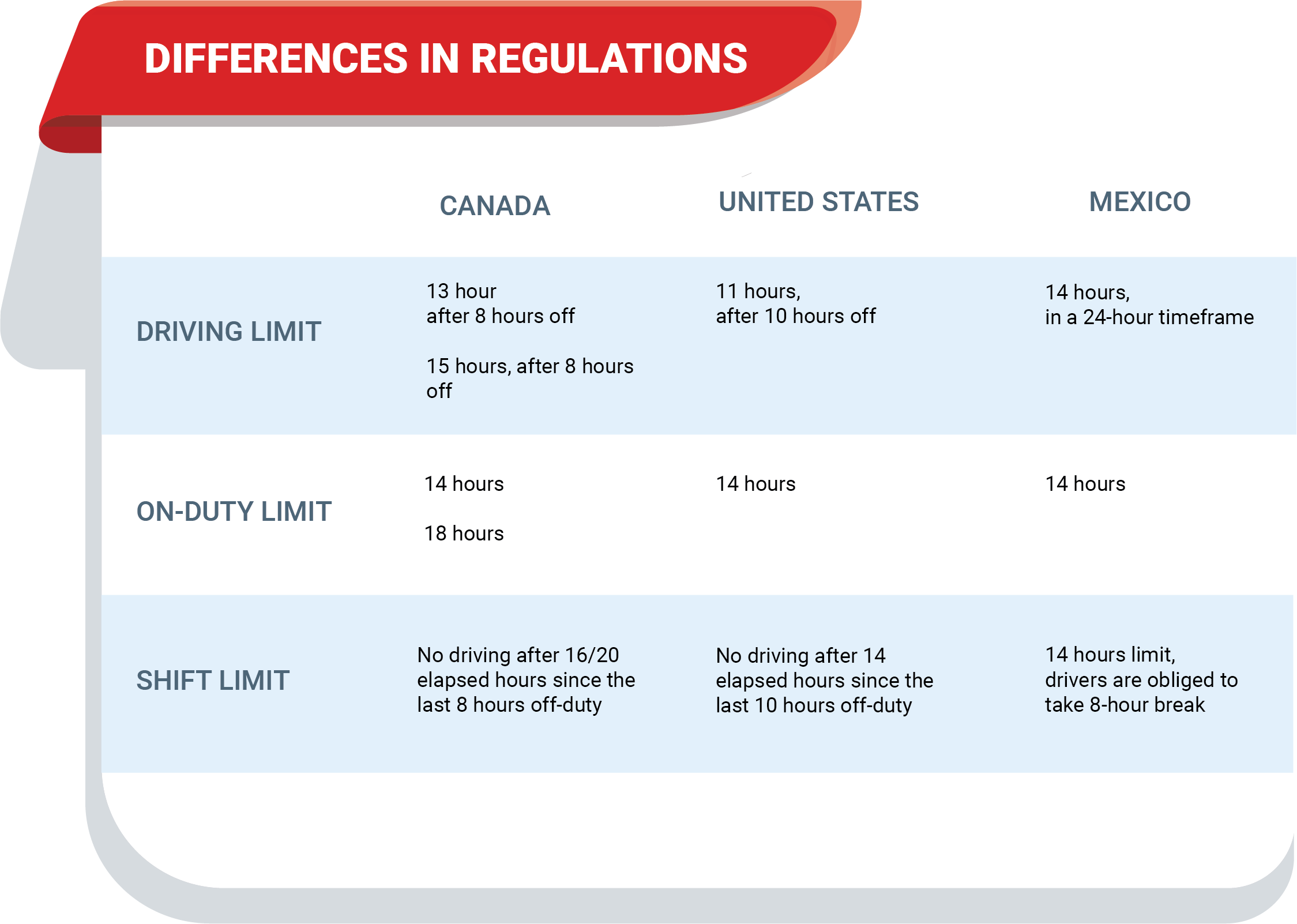Understanding Resting Times And Driving Regulations For Truck Operators In Canada, Mexico, And The United States
Explore the essential regulations governing Hours of Service (HOS) for commercial truck drivers in Canada, Mexico, and the United States. Understand how these regulations shape driving hours, rest breaks, and operational efficiency, vital for safe and seamless goods transportation across North America. Balancing driving time and rest intervals is crucial for both productivity and driver well-being in this critical sector of our economy.
In the realm of trucking across Canada, Mexico, and the United States, grasping the rules regarding rest periods and driving regulations is fundamental. Commercial motor vehicles are vehicles mainly used for business purposes, like transporting goods or passengers. Setting the maximum allowable work hours for truck drivers within a specific timeframe is highly necessary to help these truckers develop in a healthy environment. There are existing regulations that establish mandatory rest breaks and work cycles for all commercial truck drivers. Hours of Service (HOS) rules vary for drivers moving goods and those carrying passengers, with variations across the United States, Canada, and Mexico. Understanding these guidelines isn’t just about following the law; it’s about keeping the drivers safe, operations efficient, and goods moving seamlessly. The balance between driving time and essential rest intervals is key for operational success and driver well-being in this vital sector of our economy.
What defines a Commercial Motor Vehicle?
A commercial vehicle is primarily utilized for business-related purposes, including transporting goods or passengers. It is officially labeled as “commercial” when registered to a company. The Federal Motor Carrier Safety Administration (FMCSA) specifically defines a commercial motor vehicle (CMV) as any self-propelled or towed motor vehicle used on the highway for interstate commerce that meets specific criteria such as a vehicle weight of 4,500 kg (10,001 lb), is designed to transport over 16 passengers, or is used for transporting hazardous materials.
What does Hours of Service mean?
Hours of service (HOS) refer to the maximum permissible work hours for drivers of commercial motor vehicles during a specific timeframe. These regulations establish the mandatory rest periods for drivers between their shifts and outline the timing of breaks and work cycles. The restrictions regarding hours of service vary for drivers transporting goods and those carrying passengers, and there are slight variations between the regulations in the United States, Canada, and Mexico.
In the next segment, we will examine the driving regulations and mandated breaks for truck operators in Canada. The focus will be on essential regulations and guidelines governing the conduct of these vital professionals, prioritizing both safety and efficiency in their operational endeavors. As well as exploring vital concepts, like ‘off-duty’ and ‘on-duty’ times, and the meaning of working cycles for truck drivers.
DRIVING RULES AND BREAKS FOR TRUCK DRIVERS IN CANADA
The federal division overseeing transportation policies and hours of service (HOS) regulations in Canada is “Transport Canada’s Motor Carrier Division”. The HOS regulations in Canada have slight variations depending on whether the driving is above or below the 60° parallel north, which marks the division between northern and southern Canada.
One key rule for all drivers is that the carrier must ensure that all drivers in their team maintain precise daily logs, documenting the time spent on duty and off-duty for each day on the calendar. The following information is sourced by the Justice Laws in Canada and is current as of September 2023.
Shift parameters in Southern Canada.
Canada South is where the majority of Canada’s population lives. The largest provinces are Quebec, Ontario, British Columbia and Alberta.
Driving limit: A commercial vehicle operator can drive a maximum of 13 hours within a 24-hour period. As well as 13 hours within a work shift. A work shift commences after an uninterrupted off-duty period of 8 hours.
On-duty limit: A commercial vehicle operator is prohibited from driving more than 14 hours on-duty time in a day or 14 hours within a shift. Drivers can record their spread times as two options “Driving” and “On-Duty Not Driving.” After the 14-hour period, drivers are only allowed to log in times as “On-Duty Not Driving”. The driver can resume driving only after a minimum of 8 consecutive hours of off-duty time.
Shift limit: A driver may not continue their working shift after 16 consecutive hours. Before resuming driving, a driver must take a break of 8 or more continuous hours of off-duty time.
Off-duty time: Excluding the 8-hour mandatory resting period, off-duty time can be spread across the day in intervals exceeding 30 minutes each.
Shift parameters in Northern Canada.
In Canada North, there are three regions: Northwest Territories, Nunavut, and Yukon.
Driving limit: A commercial vehicle operator can drive a maximum of 15 hours during a shift and must have 8 consecutive hours off-duty before driving for another 15 hours.
On-duty limit: A commercial vehicle operator is not allowed to drive after being on duty for 18 hours during a shift. They need 8 consecutive off-duty hours before they can drive again.
Shift limit: A driver may not continue their working shift after being on duty for 20 consecutive hours. They must take an off-duty break of at least 8 consecutive hours before they are allowed to drive again.
Working cycles for Canadian drivers
Canadian commercial vehicle drivers have the option to choose between two Hours of Service (HOS) cycles.
In the United States, truck drivers strictly adhere to critical driving rules and regulations set by the Federal Motor Carrier Safety Administration (FMCSA). These encompass stringent limits on driving hours, and mandatory rest periods to mitigate fatigue, especially because these truck drivers can be driving across North America for hours. The U.S. Department of Transportation (DOT) plays a pivotal role in ensuring driver well-being by overseeing the implementation of Hours of Service (HOS) regulations. These regulations precisely delineate the permissible work hours for drivers on a daily and weekly basis. Trucking enterprises and operators of commercial vehicles are mandated to rigorously adhere to these stipulations, essential for fostering both safety and efficiency across the nation’s trucking operations.
DRIVING RULES AND BREAKS FOR TRUCK DRIVERS IN THE UNITED STATES
14-hour on-duty limit: Commercial truck drivers cannot be on-duty for more than 14 consecutive hours in a row. After this, drivers must be off-duty for 10 consecutive hours before driving again.
11-hour driving limit: In the 14-hour on-duty shift, commercial truck drivers are only allowed to drive for a maximum of 11 hours. Once the 11-hour limit is reached, the driver must take an off-duty break for 10 consecutive hours.
30-minute rest break: Commercial drivers are no longer allowed to keep driving if more than 8 hours have passed since the last break of at least 30 minutes.
60/70-hour duty limit: This limit is based on a 7-day period, commercial truck drivers are not allowed to work more than the established hours in a “weekly” period. If a driver is on duty for seven consecutive days they are not allowed to work past 60 combined hours. If the driver is working every day of the week, that driver will no longer be allowed to drive after 70 hours on duty.
34-hour restart: The rules regarding hours of service permit you to reset your 60- or 70-hour clock calculation by having an off-duty break of 34 or more consecutive hours. This means the driver will only be permitted to drive again if they drop below 70 hours worked in an 8-day period.
DRIVING RULES AND BREAKS FOR TRUCK DRIVERS IN MEXICO
The Hours of Service (HOS) regulations have been in effect for less than 5 years, a notably shorter duration when compared to the U.S. and Canada. Prior to the implementation of HOS regulations, there was a significantly wide variety of rules across the country as transportation companies could set their own driving and resting schedules. Consequently, there is a lack of information from that period.
The Mexican Hours of Service (HOS) regulations dictated drivers are restricted from driving for a total of over 14 hours within a 24-hour timeframe. Following a continuous 5-hour drive, a 30-minute break is mandated before resuming driving. Upon reaching the 14-hour limit, drivers are obliged to take a complete 8-hour break.
What is On-Duty Time?
- Any time spent at a company site, facility, or public area while waiting for dispatch.
- Every moment spent checking, maintaining, or preparing a truck, which includes fueling and washing it at any given time.
- The entire duration of all driving time.
- Every period that this dedicated to loading, unloading, overseeing, or attending to your truck, as well as managing paperwork for shipments.
- Every moment attending to your truck when it is experiencing a breakdown.
- Every moment allocated to performing any additional tasks for a motor carrier, such as providing or receiving training and driving a company vehicle.
What is Off-Duty Time?
For time to qualify as off-duty, the driver must be granted relief from all work-related duties and responsibilities. They should have the freedom to engage in activities of their preference and have the ability to depart from the location where their vehicle is parked.
How does Team Driving work?
Team driving is a collaborative approach where two drivers operate a single commercial vehicle in a coordinated manner to cover longer distances efficiently. While one driver is behind the wheel, the other rests, ensuring that the vehicle is in constant motion without exceeding regulated driving hours. This strategy optimizes travel time, enabling quicker deliveries, while still upholding compliance with strict driving regulations.
Certain companies, like Mexicom Logistics, provide team driving options for extended routes or nighttime load transportation. Utilizing two drivers for transporting the load helps mitigate the effect of mandatory rest periods on the overall transit time, and enhances driver safety. This service involves an extra driver in the truck, allowing for shifts in driving responsibilities to expedite shipping while still adhering to mandatory rest times for drivers, a requirement in Canada, the U.S., and Mexico.
Team driving significantly expedites freight transportation. Imagine a Full Truck Load (FTL) journey from Montreal to Mexico City. Without team driving, the trip to Laredo takes about 5 days. However, with a team of drivers, this can be reduced to 3 days. Now, regardless of the approach, an extra day is factored in to reach Mexico City, and at the border, there’s an additional 2-3 days for the necessary clearance processes and crossing the border. In essence, team driving shaves off crucial days from the journey, illustrating its vital role in meeting delivery deadlines and streamlining the logistics process.
Understanding the Impact of Travel Times and Resting Periods in Transportation
Travel duration within the transportation sector significantly influences various aspects of operations. Time is a big deal and can affect many things. It can be one of the most expensive and hard-to-predict parts of the whole travel process. Making things faster is often a big goal in transportation because it greatly helps. But adverse conditions when travel, can be a problem and make the costs go up. Finding the right balance between how fast you go, how much time it takes, and how much it costs is extremely important for the success of transporting goods.
The repercussions of travel duration extend to the well-being and efficacy of drivers, directly influencing the transportation of goods. Ensuring appropriate resting intervals for drivers is pivotal in upholding the secure and efficient transit of goods. Inadequate rest can precipitate driver fatigue, thereby jeopardizing safety and causing disruptions in delivery schedules. Allowing drivers sufficient breaks not only mitigates risks and enhances safety but also maintains an uninterrupted flow of goods transportation. Ultimately, recognizing the pivotal role of travel duration and resting periods in transportation planning and execution is crucial for optimizing operations and achieving successful outcomes.
In conclusion, the core of efficient and secure goods transportation lies in comprehending the intricate regulations governing Hours of Service (HOS) for truck operators in Canada, the United States, and Mexico. HOS regulations define the permissible hours of operation, including driving periods and mandated rest breaks, shaping the landscape of the transportation sector. Striking the right balance between driving durations and essential resting intervals is paramount to ensuring both operational productivity and driver safety. This equilibrium is pivotal in optimizing the efficiency of goods transportation, a vital pillar of the region’s economic activity.
SOURCES:
Driving rules for Canada
https://laws-lois.justice.gc.ca/eng/regulations/SOR-2005-313/page-2.html#docCont
Driving rules for the US
Interstate Truck Driver’s Guide to Hours of Service
Driving rules for Mexico
https://www.up.com/customers/track-record/tr070919-mexico-hos.htm












